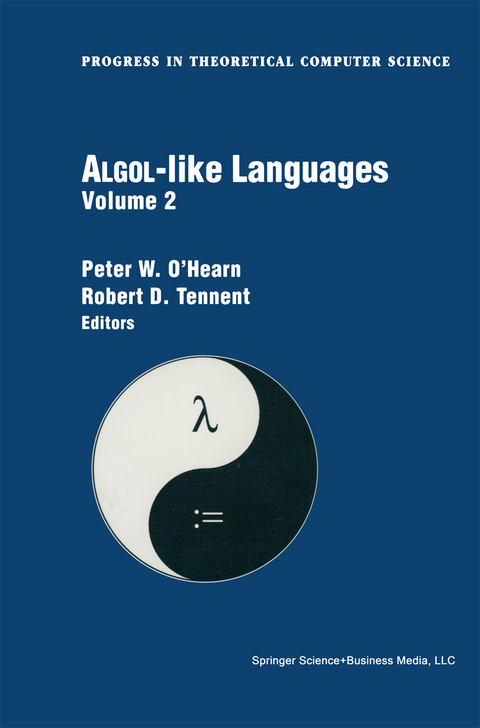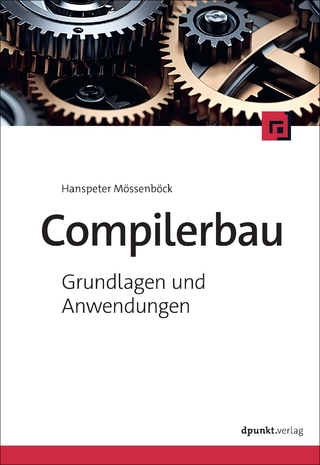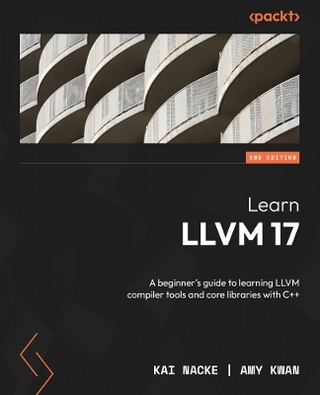
Algol-like Languages
Seiten
2013
Birkhauser Boston Inc (Verlag)
978-1-4757-3853-7 (ISBN)
Birkhauser Boston Inc (Verlag)
978-1-4757-3853-7 (ISBN)
To construct a compiler for a modern higher-level programming languagel one needs to structure the translation to a machine-like intermediate language in a way that reflects the semantics of the language. 2 Types and Syntax An ALGOL-like language is a typed lambda calculus with an unusual repertoire of primitive types.
To construct a compiler for a modern higher-level programming languagel one needs to structure the translation to a machine-like intermediate language in a way that reflects the semantics of the language. little is said about such struc turing in compiler texts that are intended to cover a wide variety of program ming languages. More is said in the Iiterature on semantics-directed compiler construction [1] but here too the viewpoint is very general (though limited to 1 languages with a finite number of syntactic types). On the other handl there is a considerable body of work using the continuation-passing transformation to structure compilers for the specific case of call-by-value languages such as SCHEME and ML [21 3]. ln this paperl we will describe a method of structuring the translation of ALGOL-like languages that is based on the functor-category semantics devel oped by Reynolds [4] and Oles [51 6]. An alternative approach using category theory to structure compilers is the early work of F. L. Morris [7]1 which anticipates our treatment of boolean expressionsl but does not deal with procedures. 2 Types and Syntax An ALGOL-like language is a typed lambda calculus with an unusual repertoire of primitive types. Throughout most of this paper we assume that the primi tive types are comm(and) int(eger)exp(ression) int(eger)acc(eptor) int(eger)var(iable) I and that the set 8 of types is the least set containing these primitive types and closed under the binary operation -.
To construct a compiler for a modern higher-level programming languagel one needs to structure the translation to a machine-like intermediate language in a way that reflects the semantics of the language. little is said about such struc turing in compiler texts that are intended to cover a wide variety of program ming languages. More is said in the Iiterature on semantics-directed compiler construction [1] but here too the viewpoint is very general (though limited to 1 languages with a finite number of syntactic types). On the other handl there is a considerable body of work using the continuation-passing transformation to structure compilers for the specific case of call-by-value languages such as SCHEME and ML [21 3]. ln this paperl we will describe a method of structuring the translation of ALGOL-like languages that is based on the functor-category semantics devel oped by Reynolds [4] and Oles [51 6]. An alternative approach using category theory to structure compilers is the early work of F. L. Morris [7]1 which anticipates our treatment of boolean expressionsl but does not deal with procedures. 2 Types and Syntax An ALGOL-like language is a typed lambda calculus with an unusual repertoire of primitive types. Throughout most of this paper we assume that the primi tive types are comm(and) int(eger)exp(ression) int(eger)acc(eptor) int(eger)var(iable) I and that the set 8 of types is the least set containing these primitive types and closed under the binary operation -.
11 Functor Categories and Store Shapes.- 12 Using Functor Categories to Generate Intermediate Code.- 13 Semantical Analysis of Specification Logic.- 14 Semantical Analysis of Specification Logic, 2.- 15 Full Abstraction for the Second-Order Subset.- 16 Parametricity and Local Variables.- 17 Operationally-Based Reasoning About Local Variables.- 18 Syntactic Control of Interference Revisited.- 19 Global State Considered Unnecessary.- 20 Linearity, Sharing and State.- 21 The Essence of Parallel Algol.- of Volume 1.
| Reihe/Serie | Progress in Theoretical Computer Science |
|---|---|
| Zusatzinfo | VII, 349 p. |
| Verlagsort | Secaucus |
| Sprache | englisch |
| Maße | 155 x 235 mm |
| Themenwelt | Mathematik / Informatik ► Informatik ► Programmiersprachen / -werkzeuge |
| Informatik ► Theorie / Studium ► Compilerbau | |
| Mathematik / Informatik ► Mathematik ► Angewandte Mathematik | |
| ISBN-10 | 1-4757-3853-6 / 1475738536 |
| ISBN-13 | 978-1-4757-3853-7 / 9781475738537 |
| Zustand | Neuware |
| Informationen gemäß Produktsicherheitsverordnung (GPSR) | |
| Haben Sie eine Frage zum Produkt? |
Mehr entdecken
aus dem Bereich
aus dem Bereich
a beginner's guide to learning llvm compiler tools and core …
Buch | Softcover (2024)
Packt Publishing Limited (Verlag)
49,85 €


